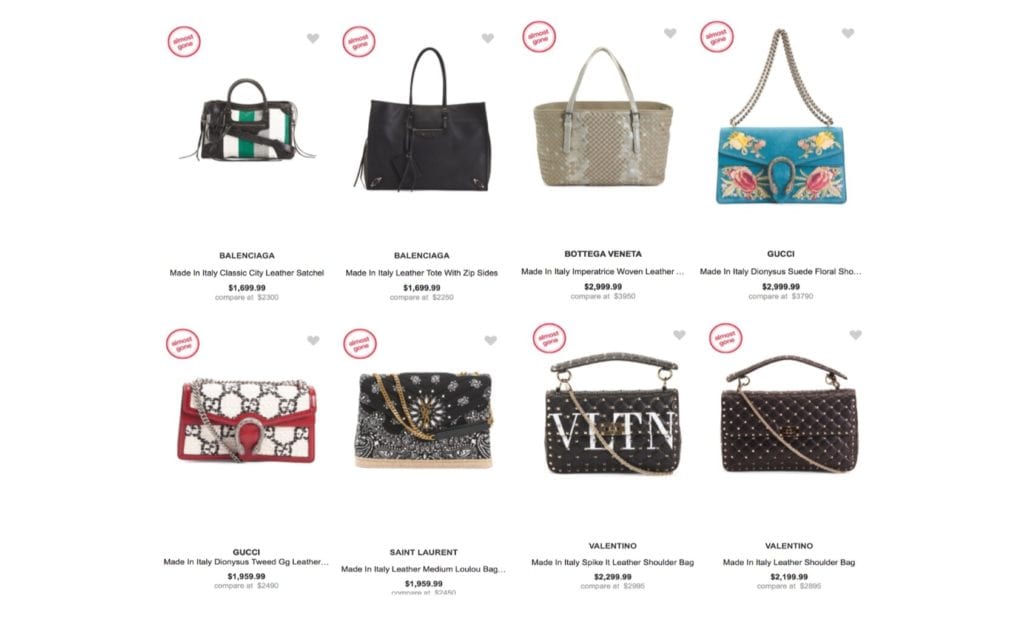Off-price retail continues to be a goldmine as T.J. Maxx’s parent company reported net sales of a whopping $10.5 billion for the three months ending on November 2. In beating analysts’ forecasts for its quarterly sales, Framingham, MA-based TJX Companies – which owns T.J. Maxx, Marshalls, and HomeGoods, among other discount retail chains – upped its profit forecast for the rest of the year, according to the Wall Street Journal, and touted its ongoing ability to lure consumers into its stores in furtherance of its signature “scavenger hunt” shopping experience.
Given the nature of the TJX Co. model, the retail giant has other brands to thank for quite a bit of its success. In addition to citing “strong traffic to its stores” as a take-away for the quarter, TJX Co. CEO Ernie Herrman pointed to the availability of other brands’ products as helping it to boost sales. “We are seeing fantastic, widespread availability of quality, branded merchandise and are in a great position to capitalize on these opportunities,” Herrman said this week.
Inventory struggles at department stores are funneling products into the TJX Co. pipeline, thereby, “fueling phenomenal access to goods,” according to a note from equity research, sales and trading firm MKM Partners, cited by Retail Dive. “Structurally, we believe inventory access will only get better from here, which should support ongoing apparel growth,” in particular, for the 32-year old TJX Co., MKM’s Managing Director Roxanne Meyer further asserted.
This is good news for TJX Co. and its shareholders, as a steady stream of new consumer goods, including garments and accessories, is critical to the success of this particular retail empire and its marquee brands, T.J. Maxx and Marshalls, which readily boast a supply of authentic, unworn designer garments and “it” bags in order to entice consumers, who are eager for a fashion “score.”
According to a statement previously provided by a rep for T.J. Maxx, the source of the chains’ inventory is mixed: “We buy from all kinds of vendors, and we take advantage of a wide variety of opportunities, which can include department store cancellations, a manufacturer making too much product, or a closeout deal when a vendor wants to clear merchandise at the end of a season, as well as lots of other ways.” Hence, the steady flow of products to off-priced retailers in light of department store struggles, which helps to explain how it is that at least some of the retailers’ fashion offerings end up on shelves and racks in its outposts across the country.
But TJX Co.’s chain of supply is not necessarily that straightforward. It is worth noting that in addition to department stores and e-commerce retailers that are routinely looking to offload unsold merch, many brands, themselves, are not entirely removed from this equation, regardless of the image they project to the media. In fact, it is not uncommon for brands to very quietly sell off over-produced and/or unsold their merchandise to retailers like T.J. Maxx and online equivalents, or to turn a blind eye when their authorized retailers do so (potentially in violation of their vendor agreements) in an attempt to bring in as much as millions of dollars at the end of the season on merchandise that might otherwise be destroyed.
Last year, Business of Fashion, citing sources in the industry, confirmed that while “few luxury brands will discuss the practice” of off-loading unsold products to retailers outside of their authorized distribution chain, “most participate in some form [of this], including Gucci, Prada, Dior, Louis Vuitton and Valentino,” for example.
Brands are willing to tolerate this type of “grey market activity” – or instances in which genuine products are sold outside of a brand’s authorized channels without the authority of the intellectual property rights owner – “for the sake of making their short-term results better, never mind the long-term damage,” Luca Solca, the former head of luxury goods at Exane BNP Paribas, told the site. Solca estimated that the grey market accounts for “5 to 10 percent of sales” for many luxury brands.
This parallel market is not only to the benefit of discount-seeking consumers, who want to land a Gucci bag on the cheap(er). It is big business for the likes of TJX Companies, which routinely brings in more money than some of fashion’s most sought-after brands and well-known conglomerates. Last year, for instance, TJX Co. generated revenues of $35.9 billion, in its “23rd consecutive year of comparative sales growth,” thereby, topping the $20 billion annual sales figure reported by Gucci, Saint Laurent, Bottega Veneta, and Balenciaga’s parent company Kering for the year, which the Paris-based conglomerate’s chairman François-Henri Pinault called an “outstanding” year and a “significant outperformance of our sector.”
From a bottom line perspective, TJX Co. had an even better year, and that momentum has carried over well into 2019.
For the first nine months of the fiscal year, TJX reported net sales of $29.5 billion, a 6% increase over the same period last year. Consolidated comparable store sales for the first nine months increased 4%, while net income for the first nine months was $2.3 billion.











